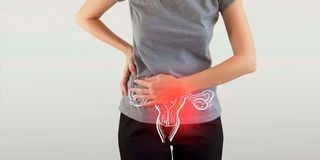
Valerie Wangithi says she can no longer stand the pain that comes with endometriosis.
If you are trying to get pregnant, it is important to understand the concept of 'ovarian reserve'. Knowing how many eggs you have and how lifestyle factors can affect your ovarian reserve is crucial to making informed decisions about your ability to conceive.
Dr Kireki Omanwa, a consultant obstetrician, gynaecologist and fertility specialist, describes ovarian reserve as the number and quality of a woman's eggs, which plays an important role in female fertility. This is in contrast to men, who produce sperm throughout their lives.
He says that a baby girl can have about a million eggs when she is born. A woman's ovarian reserve is established before she is born, and as she ages her ovarian reserve gradually decreases, as does her fertility.
“Once a woman reaches puberty and starts having menstrual cycles, the number of eggs she has drops to about 500,000. The significant drop in the number of eggs from birth to puberty is normal and is due to a process called atresia, where the eggs die naturally and are reabsorbed by the body,” says Dr Omanwa.
How many eggs are lost in each menstrual cycle?
Regarding the number of eggs lost per period, although only one egg is normally released during ovulation, Dr Omanwa says that the ovaries prepare many eggs each month.
"Usually, one egg becomes dominant during each menstrual cycle and continues to mature. The remaining eggs that aren't released are reabsorbed by the body. This is why women lose so many eggs each month. By the time she starts having her period, which is usually around 10 to 14, or 11 to 12 for those who experience early onset puberty, the number could have dropped by about half, to around half a million. And again, it is estimated that she could lose between 800 and 1,000 eggs during this time," says Dr Omanwa.
He notes that when a woman is young, as soon as she starts menstruating, her ovarian capacity is very high, or high enough, until around her 30s and mid-30s. After the mid-30s, ovarian function starts to decline.
"If you start menstruating at the age of 13, by the time you're 35 you'll have been menstruating for 22 years and you'll lose between 800 and 1,000 eggs every month," he says.
Dr Omanwa explains that this does not mean that women who cannot have children do not have eggs.
So what happens to the eggs before they reach puberty?
Dr Omanwa explains that about a million eggs are dormant until the hypothalamic-pituitary-ovarian (HPO) axis becomes active. The HPO axis is a complex system of hormones that regulates the reproductive cycle and awakens the dormant eggs.
"What happens is that there is a hormone called follicle-stimulating hormone (FSH). It stimulates the follicles that are sleeping or dormant," says Dr Omanwa.
Ovarian reserve and egg quantity
While ovarian reserve refers to the number and quality of eggs in a woman's ovaries, decreased ovarian reserve occurs when a woman has fewer eggs than others her age. This often happens as women get older, resulting in fewer eggs and poorer egg quality.
According to Dr Omanwa, ovarian reserve can have a significant impact on a woman's chances of becoming pregnant, especially if a woman is undergoing in vitro fertilisation (IVF). However, it's important to note that the number of eggs isn't the only factor that affects a person's ability to conceive.
"The fallopian tubes can have problems that affect the baby's journey to the womb. These problems can be related to hormones, fibroids, endometriosis and metabolic problems such as diabetes and high blood pressure. Fibroids, which are large and can affect the baby's development, and metabolic problems such as diabetes and high blood pressure can also be problematic," he says.
How many eggs does a woman need to conceive?
A woman only needs one egg to become pregnant. Normally, one egg is released from her ovaries each month during ovulation, although more than one egg is often produced. If the egg is fertilised by sperm, pregnancy can occur.
However, the chances of conception are influenced by several factors, including the timing of sexual intercourse, the quality of the sperm and egg, and the overall reproductive environment. So even though only one egg is needed, fertility and pregnancy depend on a complex interplay of factors beyond the number of eggs available.
How to check your egg count
Dr Omanwa says a blood test can be used to check for a hormone called anti-miller hormone (AMH).
"If the AMH is high, it is assumed that the ovarian count is also high. But we usually check this by doing a transvaginal scan and assessing the ovaries, doing something called antral follicle count. Antral? Antral follicle count," he says.
Dr Omanwa explains that women with poor egg quality may take longer to become pregnant because they have a reduced number of eggs, and the eggs they do have may be of poor quality.
In addition, egg quality declines as women age due to the natural ageing process, which affects both the eggs and the ovarian environment.
Over time, eggs can accumulate DNA damage from environmental exposures and the gradual decline in the body's ability to repair genetic material.








